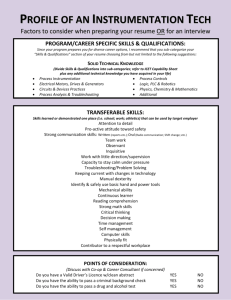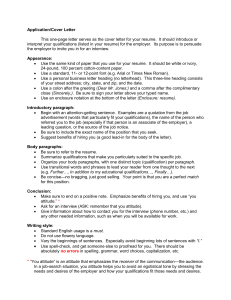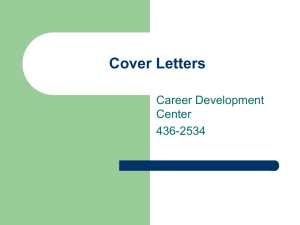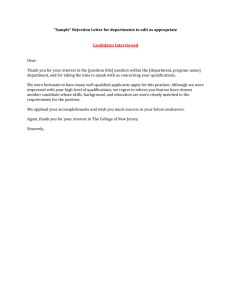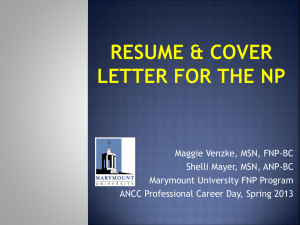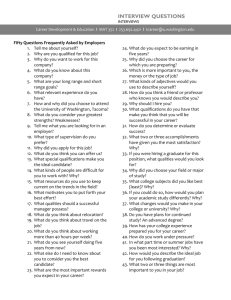Why write a resume?
advertisement
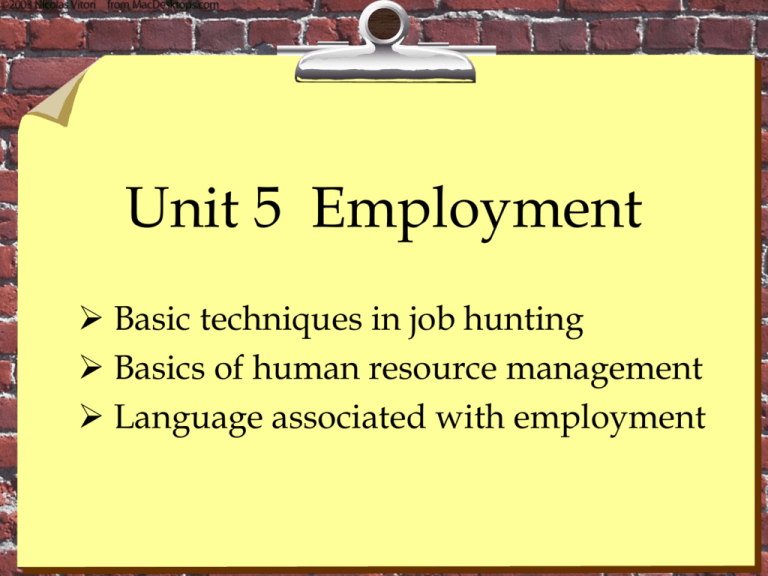
Unit 5 Employment Basic techniques in job hunting Basics of human resource management Language associated with employment Part 1 Hunting a job job market/labour market Part 1 Hunting a job Group work: • In your opinion, which factors are important for getting a job? List three most important ones. • Survey: which factors are attached importance to by employers in their selecting candidates? (recruitment ads, reports, interviews, etc.) I. Write your résumé/curriculum vitae Why write a resume? A silly question—to get a job of course! But why else? • to persuade your readers you are the best person for the job • to construct a professional image of yourself and establish your credibility • to provide a sample of your written communication skills • to convince prospective employers you deserve an interview Write your résumé /curriculum vitae • Your résumé gives an employer a quick, general idea of who you are, what qualifications you have and why you want the job. • Most résumés include information under headings like Personal Information, Job Objective, Qualifications, Education, Work Experience, Language Proficiency, Honours and Activities, Licenses and Certifications, etc. • Personal Information – Name – Sex/Gender – Date of Birth/Age – Telephone – E-mail – Address • Job Objective/Job Goal/Career Goal – In one sentence, describe your job goal, summarizing the position(s) you are applying for and/or your main qualifications. This tells the employer exactly what type of work you're looking for. (not just the position applied) •Qualifications List the special abilities and skills that relate to the job you're applying for. • Education – start with the most recent diploma or training course. e.g. 2006-Present Guangdong University of Foreign Studies Candidate for Bachelor of Economics Degree in Economics, June 2010 •Work Experience List the companies you worked for, with cities and provinces, and the dates (month, year) you worked for each job or volunteer position. Pattern: Date Company Position Main duties • Language Proficiency e.g. English, fluent in spoken and written (CET-Band 6) Japanese, able to read •Honours and Activities academic awards and scholarships membership in campus, national, or international organizations (Memberships) leadership positions held in campus, national, or international organizations university and community service positions date of award or dates of involvement in an activity • Licenses and Certifications Driver’s License BEC Higher Level Certificate TEFL Certificate (Teaching English as a Foreign Language) Some principles • KISS principle (concise but but simple) • Parallel • Being well-organized • Being error-free • Relevant information (selling points) • Being distinctive Write a cover letter • A cover letter introduces you and your resume to an employer, and you should send a cover letter with every resume you submit. • In your cover letter, state why you are writing, why you are the best person for the job, and when you plan to contact your prospective employer. • It gives you the opportunity to draw your readers' attention to specific qualifications. A resume presents a lot of information about your past employment and education, while a cover letter features specific qualifications that you think will impress your readers the most. Write a cover letter • It provides a sample of your written communications skills. Showing you can write well will demonstrate your intelligence and help to establish your credibility. Always write cover letters with care, because, like resumes, cover letters create an image of who you are as a professional. • You should plan to write a new cover letter for every position you apply for, because cover letters should be tailored to the needs of your readers. A cover letter has four essential parts: heading, introduction, argument, and closing. • A heading provides your contact information (your name, address, phone number, and e-mail address), the date you're writing, and the address of the company to which you are applying. • An introduction begins with a greeting, such as "Dear Ms. Dawson," followed by a statement of who you are and why you're writing. • In your argument, you should describe the most important qualifications that prove why you are the best person for the job. • A closing reveals what you plan to do after your readers have received your resume and cover letter. Your letter ends with a salutation and signature, such as "Sincerely," or "Sincerely Yours." II. Prepare for interviews • recruit • recruitment • recruiter • job applicant/candidate • to apply for • job fair • recruitment talk • interviewer • interviewee • fresh graduate; former graduate II. Prepare for interviews Trained interviewers are able to obtain considerable insight into the prospective employee’s goals, attitudes, and motivations. • Information about the company/organization and the position you apply for (history, scope of business, job responsibilities, corporate culture, wage rates/levels, training & advancement opportunities, regulations, etc.) • Questions • Etiquette General questions • Self-introduction • What made you choose our company? • What do you know about our company? • Why do you consider yourself qualified for this job? • What interests you most about this job? General questions • What's your career objective? • What do you consider important when looking for a job? • What are you interested in working in this company? • What do you think you would bring to this job? • Why should I hire you? • What salary do you expect/ask for? • Do you have any questions? Tips on your answers • Be concise. • Be practical. • Be specific. • Be well-organized. • Be distinctive. (story-telling, a new perspective…) Part 2 Human resource management • Human resource management: Process of acquiring, training, developing, motivating, and appraising a sufficient quantity of qualified employees to perform necessary activities; and developing activities and an organizational climate conducive to maximum efficiency and worker satisfaction. Core responsibilities: Developing a comprehensive strategy for meeting future human resource needs. • Human resource planning • Recruitment and selection • Training/management development • Performance appraisal • Compensation and employee benefits Recruitment and Selection • High costs (interviews, tests, medical examinations, training) • Philosophy: “Don’t try to fit a square peg into a round hole!” • Make sure that potential employees have the necessary qualifications for the job and that they either possess future skill needs or are capable of learning them. Exercises • p.39 Reading “Choosing the right candidate” • p.40 Listening “Recruitment interviewing” Hunting a job Group work: • In your opinion, which factors are important for getting a job? List three most important ones. • Survey: which factors are attached importance to by employers in their selecting candidates? (recruitment ads, reports, interviews, etc.) Important factors • Creativity • Team spirit • Communication and presentation skills • Learning ability — “招聘单位最看重求职者什么——百家知名企业选人标准研究报告” Important factors • Specialized skills and background • Cultural identity (corporate culture) • Development potential • English proficiency • Work experience • Moral characters — “招聘单位最看重求职者什么——百家知名企业选人标准研究报告”
